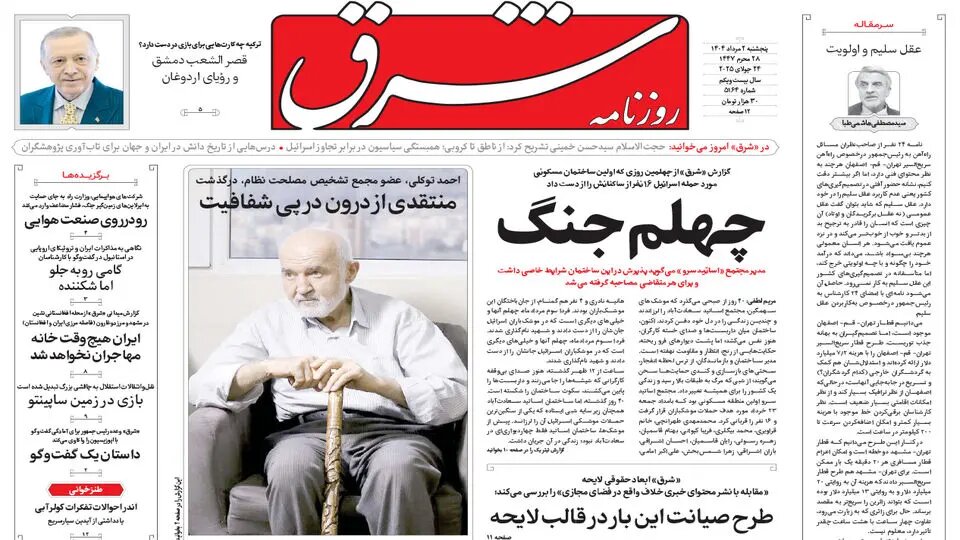The intersection of threat and strategy

TEHRAN - Shargh devoted its main headline to the continuation of Iran’s negotiations with the three European countries of Germany, Britain, and France, known as E3, in Istanbul and wrote: On the eve of the meeting between Iran and the three European countries in Istanbul, the nuclear diplomacy has once again been subjected to a difficult test.
These talks are being held while Europe has warned that if there will be no progress, the snapback mechanism will be activated the international sanctions will return. It can be seen that these talks are, above all, an arena for testing diplomacy in the midst of regional tension and international pressure. The Istanbul talks are the intersection of tensions and hopes, where Iran and the Europeans, in a critical situation, are cautiously trying to find a solution that, while preserving Iran’s national interests, will prevent the situation from worsening further. Ultimately, it can be said that the fate of these talks is important not only for Iran and the Europeans but also for the stability of the entire region and even the geopolitical equations beyond it. All eyes are on Istanbul, where a possibility of victory or defeat, together, will shape the narrative of a complex and uncertain future.
Ham Mihan: Balancing diplomacy
In a note, Ham Mihan addressed the trilateral meeting of Iran, China and Russia and said: By signing the JCPOA, we opened our arms to Europe and abandoned the Eastern parties, and, naturally, they will not count on us for long-term cooperation. Now, in a situation where Iran and the United States have gone through a direct war, those fantasy views on the Eastern countries certainly cannot meet Iran's national interests. If we intend to take advantage of the capacity of the Eastern powers to balance against the Western side, we must change the negotiation strategy to achieve tangible issues and gain practical achievements, and engage China and Russia in the pursuit of common interests. If the recent trilateral meeting of Iran, China, and Russia is just going to be a propaganda tool without strategic changes, it not only will not bring any benefits, but also will not advance towards balancing in any way, and will produce the opposite result. One of the shortcomings of our governance structure is the lack of timely and bold decision-making, which we hope the diplomatic apparatus will end this situation in terms of balancing with global powers, while respecting national interests.
Hamshahri: Iran's secret weapon against the Republic of Azerbaijan
In an analysis, Hamshahri addressed the oil and gas reserves of the Caspian Sea especially as the Republic of Azerbaijan supplies 40 percent of Israel’s energy needs from the sea’s resources. It wrote: The oil and gas resources of the Caspian Sea have once again become the focus of global attention in recent weeks. Azerbaijan, by supplying about 40 percent of the Zionist regime's oil, has an important position in supplying the regime's energy needs. These resources are mainly extracted from the Caspian Sea oil and gas fields. There is disagreement about the Caspian Sea's oil reserves. The U.S. Energy Information Administration (EIA) has estimated the sea’s oil reserves at about 200 billion barrels, but the Oxford Energy Institute puts the figure between 25 and 35 billion barrels. If the Oxford estimate is correct, the Caspian share of oil reserves in the world will be only about 3 percent, not the 16 percent announced by the EIA. In this case, the possibility that the Caspian Sea would be an alternative to the Persian Gulf in oil supply will be greatly reduced. Overall, Iran can reduce the perception of Azerbaijan as a supporter and energy supplier of the Zionist regime by increasing production from joint fields, which is Iran’s secret weapon against Baku and the Zionist regime.
Arman-e-Melli: Impact on Tehran-Washington ties
Arman-e-Melli analyzed the impact of talks between Iran and Europe that started in Istanbul on Friday on the future of interaction between Iran and the United States. It wrote: Although the U.S. is not directly present in the Iran-Europe talks in Istanbul, they practically serve as a barometer of future interaction between Iran and the U.S. in the future. If these talks end in an agreement or an opening, the possibility that Iran and the U.S. would return to diplomacy will increase, but if the talks fail, the path will be directed towards confrontation, increased pressure, and even regional tensions. If the Iran-Europe talks lead to tangible progress, the United States is likely to view this as a positive sign for a return to the diplomatic path. In this case, Washington may take indirect steps to resume contact with Tehran through intermediaries such as Oman or the European Union. It should also be noted that the outcome of the Istanbul talks could influence the U.S. decision on secondary sanctions or UN Security Council sanctions. If Europe is convinced that Iran has taken steps to reduce tensions, it may pressure the U.S. to refrain from imposing new sanctions and even encourage it to engage in multilateral talks.
Leave a Comment